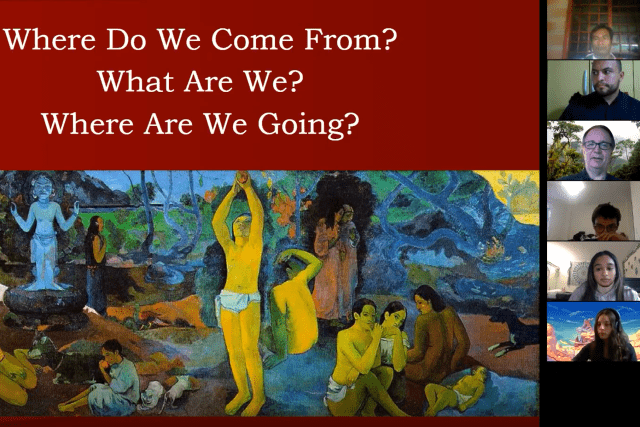By Pablo J. Sanchez

Frankling Antunish (top right) presents for a class discussion on anthropological theory and applied research methods, to offer a community partner perspective.
In 2012, the Ozanam Scholars Program organized its inaugural trip to Morona Santiago, Ecuador, and established an ongoing partnership with four Indigenous Shuar and mestizo communities in the Limon Indanza region. What began as a service and research trip driven by principles of global citizenship and Vincentian service has since evolved into an accredited academic service-learning course under the interdisciplinary minor in Social Justice: Theory and Practice in the Vincentian Tradition.
Layering on these principles, the course explores the intersection of anthropological theory, applied research methods, and practice in sustainable community partnerships. Traditionally implemented as an experiential learning course where faculty, administrators, students, and community partners work together over a two-week period in Ecuador, this year has challenged the course to consider its driving principles and translate them into a digital space.
We knew not every detail of the experience could be substituted, both in terms of student development and sustaining the community partnership. While there is no replacing the relationships built or perspective gained through in-person dialogue and communal work, we believe the pandemic offered a new opportunity to reimagine the partnership and test strategies to strengthen dialogue between the Ozanam Scholars Program and Ecuador-based community partners.
Together with our community partners, we reflected on the key elements of the experience—cultural exchange, community dialogue, sustainable partnership, and fair-trade learning—and whether they could feasibly be adapted into virtual learning opportunities that were mutually beneficial to the Ozanam Scholars and participating community members alike. In coordination with community leaders and Shuar educators, including, Franklin Antunish, Director of Velasco Ibarra Elementary School, and Carlos Chiriap, Director of the Unidad Educativa de Yunganza, an adapted strategy was developed that centered on critically reflective dialogue, mutual knowledge exchange, and innovative approaches for direct engagement.
Through the use of Zoom and Google Classrooms, we implemented a number of strategies: Ecuador-based community educators led virtual lessons for Ozanam Scholars on Shuar education, traditional knowledge, and local history; leaders from each community participated in a virtual panel discussion, fielding and presenting questions on changes in their community due to the pandemic; Ozanam Scholars created Google Classrooms, presenting research from previous trips and prompts to engage high school students from each of the respective communities; and finally, during a culminating virtual event held at the end of May, Ozanam Scholars and community partners shared lessons learned and recommendations for the next iteration of the course.
Reflecting on these adaptations, Shuar leader and educator Carlos Chiriap shared: “This is a unique opportunity for us to share Shuar art, culture, and knowledge, especially for students, teachers, and parents of the Unidad Educativa de Yunganza. This effort will help highlight our institution as an international learning space, promoting our students across communities, the province, and the Amazon region, where we can say the art, culture, and science of Shuar people are used as referential knowledge in the academic course work of St. John’s University.”
Related News
Q&A with School of Education Alumna Linda I. Rosa-Lugo, Ed.D. ’77ED, ’79M.S.Ed.
Linda I. Rosa-Lugo, Ed.D. ’77ED, ’79M.S.Ed., recently accepted a new role as President of the American Speech-Language-Hearing Association (ASHA). Prior to this, Dr. Rosa-Lugo has been an active...
TSOE Alumna Appointed Director of Curriculum in Amityville
Jessica Kemler ’99ED,’22Ed.D.—a double alumna of The School of Education at St. John’s University—began the new year as the new Director of Curriculum in the Amityville, NY, School District. “We are...
Alumna Celebrates Book Launch After Career Change
After developing a passion for helping the younger generation, Ashley Wilson ’14M.S.Ed. pivoted from a career in the music industry to work as an educator. She is also making her mark through her new...
